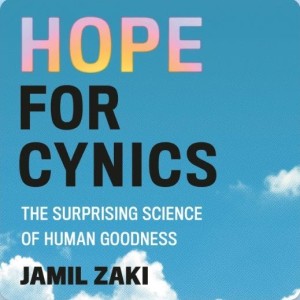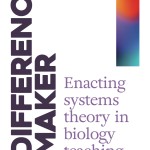 When I first picked up Hope for Cynics: The Surprising Science of Human Goodness by Jamil Zaki, I thought, “I’m a hopeful person—why would I want to read about how to not be a cynic?” But as I made my way through the early pages, I realized cynicism had quietly become normalized in my life, and I had missed the signs. It had been parasitically pulling my hope away. Maybe it was the political turbulence of recent years, natural disasters, or the perceived decline of intellectual value, but noticed I was infected with cynicism by a thousand little cuts, unaware of the changes around me.
When I first picked up Hope for Cynics: The Surprising Science of Human Goodness by Jamil Zaki, I thought, “I’m a hopeful person—why would I want to read about how to not be a cynic?” But as I made my way through the early pages, I realized cynicism had quietly become normalized in my life, and I had missed the signs. It had been parasitically pulling my hope away. Maybe it was the political turbulence of recent years, natural disasters, or the perceived decline of intellectual value, but noticed I was infected with cynicism by a thousand little cuts, unaware of the changes around me.
Reading this book was a revelation. I was surprised to discover areas of myself I didn’t even know needed to find hope again. I was surprised by the personal elevation of cynicism I had begun to imbibe from my culture. Zaki’s insights gave me a renewed sense of self and opened my eyes to the warning signs of creeping cynicism. The book helped me begin a journey back to hope and trust. Like many, I had confused cynicism with skepticism. As Zaki points out, cynicism is a lack of faith in people, while skepticism is a lack of faith in assumptions. Through stories of admiration for a close friend, Zaki found the power of “hopeful skepticism”—a blend of curiosity and love for humanity.
Jamil Zaki challenges the belief that cynicism is a mark of wisdom. Instead, he reveals it as a reaction to disappointment that ultimately harms our mental health, relationships, and society. The book explores the surprising science behind human goodness, offering evidence that people are far more cooperative and honest than we’re led to believe. Zaki shares how our negativity bias and the media’s focus on bad news distort our worldview, leaving us to think the worst of humanity.
Through his artful blend of science and personal storytelling you will empathize with his protagonists and have your curiosity and sense of exploration expanded. Zaki’s research is fascinating, but it’s his honesty and warmth that make it truly memorable. He weaves in stories of friends, historical figures, and his own life, crafting a narrative that feels both intimate and universal. His reflections on how cynicism has affected him—and how hope has transformed him—are deeply relatable.
Zaki doesn’t stop at diagnosing the problem; he provides practical strategies for change. From practicing gratitude to building stronger relationships, his advice is both research-based and actionable. One of the most impactful lessons for me was learning to appreciate the cynics in my life. I realized I could love them more deeply by understanding where their cynicism came from and recognizing their potential for growth, just as I saw in myself.
By the time I finished Hope for Cynics, I felt reinvigorated. Zaki’s hopeful message reminded me that cynicism isn’t inevitable—it’s a habit we can unlearn. While the tips are thoughtfully collected in the appendix for rapid reminders and exercises, this book isn’t just a collection of tips or research findings; it’s a deeply emotional, thought-provoking journey that will leave you questioning your assumptions and embracing the possibility of human goodness.
Hope for Cynics is an invaluable read for teachers, administrators, students, and anyone looking to foster a more positive and productive environment. The book offers practical strategies for overcoming cynicism, which can be especially beneficial in educational settings where trust, empathy, and collaboration are essential. Teachers and administrators can use the insights to build stronger relationships with students and colleagues, promote a more hopeful and inclusive atmosphere, and counteract the negativity often prevalent in modern discourse. Students, too, will find the book inspiring, as it encourages a shift toward a more balanced, optimistic view of human nature, which can enhance their emotional well-being and academic success. By applying Zaki’s insights, individuals in education can create more trusting, resilient communities.
Whether you’re struggling with cynicism yourself or simply looking for ways to foster a more hopeful outlook, this book offers a roadmap to a richer, more connected life. It’s the kind of book you’ll return to for inspiration and guidance—a heartfelt, empowering read that deserves a spot on everyone’s shelf.



